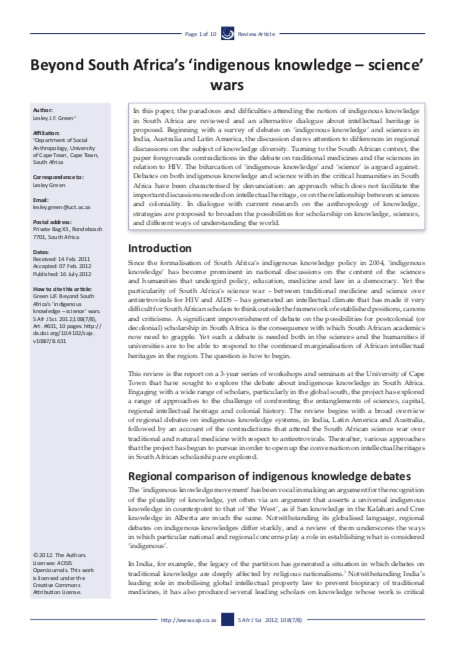
Abstract: "In this paper, the paradoxes and difficulties attending the notion of indigenous knowledge in South Africa are reviewed and an alternative dialogue about intellectual heritage is proposed. Beginning with a survey of debates on ‘indigenous knowledge’ and sciences in India, Australia and Latin America, the discussion draws attention to differences in regional discussions on the subject of knowledge diversity. Turning to the South African context, the paper foregrounds contradictions in the debate on traditional medicines and the sciences in relation to HIV. The bifurcation of ‘indigenous knowledge’ and ‘science’ is argued against. Debates on both indigenous knowledge and science within the critical humanities in South Africa have been characterised by denunciation: an approach which does not facilitate the important discussions needed on intellectual heritage, or on the relationship between sciences and coloniality. In dialogue with current research on the anthropology of knowledge, strategies are proposed to broaden the possibilities for scholarship on knowledge, sciences, and different ways of understanding the world."
Keywords: intellectual heritages, indigenous knowledge, modernist ontologies, South Africa, Western science
Lesley Green, "2012. Green. "Beyond South Africa’s ‘indigenous knowledge – science’ wars"", contributed by Angela Okune, STS Infrastructures, Platform for Experimental Collaborative Ethnography, last modified 4 June 2018, accessed 27 July 2024. http://www.stsinfrastructures.org/content/2012-green-beyond-south-africa’s-‘indigenous-knowledge-–-science’-wars
Critical Commentary
Angela Okune: In this 2012 paper, Lesley Green argues against pitting "traditional knowledge" against "Western science" in South Africa and holds that instead of further promoting such a bifurcation, it is important to “recognize the entanglement with capital in current state-led approaches to indigenous knowledge in South Africa.” She holds that once that is on the table for discussion, it becomes possible to ask different kinds of questions and develop different kinds of intellectual projects.